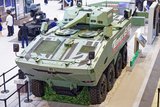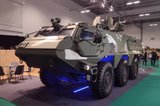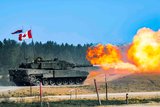Kazakhstan orders more Arlans
The Ministry of Industry and Infrastructural Development in Kazakhstan has signed a contract with Kazakhstan Paramount Engineering (KPE) for a new batch of 4x4 Arlan MRAP armoured vehicles, for delivery in 2021.
The Kazakh armed forces have been using Arlan since August 2016 as a variant of the Marauder produced by South Africa-based Paramount, which operates KPE as a JV with local company Kazakhstan Engineering.
Arlan vehicles are all locally manufactured (with up to 70% of components sourced in Kazakhstan) at the 15,000m2 KPE production facility in Nursultan.
The MRAP vehicle has a top speed of 120km/h and an operational radius of 700km. It can ford 1.2m-deep water obstacles and climb gradients of 60%. The double-skin monocoque, V-shaped hull structure can withstand 7,62mm and 5,56mm rounds and the vehicle also offers blast protection against mine explosions of 10kg TNT beneath the hull under any wheel, according to KPE.
John Craig, executive chairman of Paramount Land Systems Group, said the COVID-19 coronavirus pandemic ‘has highlighted the importance of security of supply during a global emergency. Now more than ever governments are looking at the indigenisation of industrial capabilities in a bid to reduce exposure to global market volatility and uncertainty’.
Related Equipment in Defence Insight
More from Land Warfare
-
![US DoD task force’s DroneHunter acquisition lays groundwork for Replicator 2 CUAS strategy]()
US DoD task force’s DroneHunter acquisition lays groundwork for Replicator 2 CUAS strategy
As the US Department of Defense looks to counter the growing threat of uncrewed aerial systems to improve homeland security, the DroneHunter acquisition could point to future commercial innovation.
-
![Norway opts for Hanwha’s Chunmoo for long-range fires under $2 billion deal]()
Norway opts for Hanwha’s Chunmoo for long-range fires under $2 billion deal
The selection of Hanwha’s K239 Chunmoo long-range precision fires system, with a contract expected to be signed on 30 January, makes Norway the second European country to choose the system. It is expected an operational system will be in service within four years.
-
![Canada looking to expedite purchase of armoured fighting vehicle and a new tank]()
Canada looking to expedite purchase of armoured fighting vehicle and a new tank
Canada is improving its Leopard main battle tank fleet but before this is fully completed, it is expected to begin looking for new vehicles.























